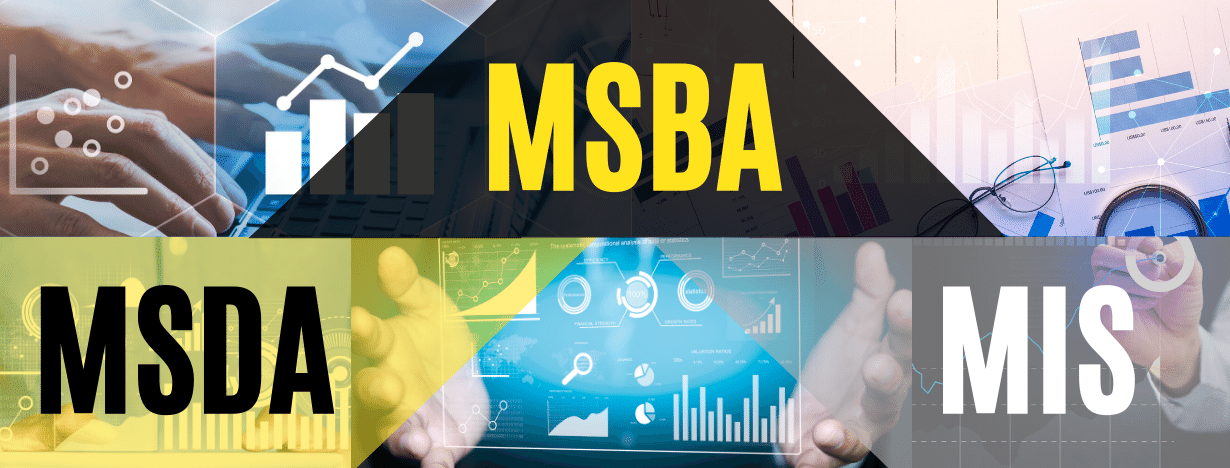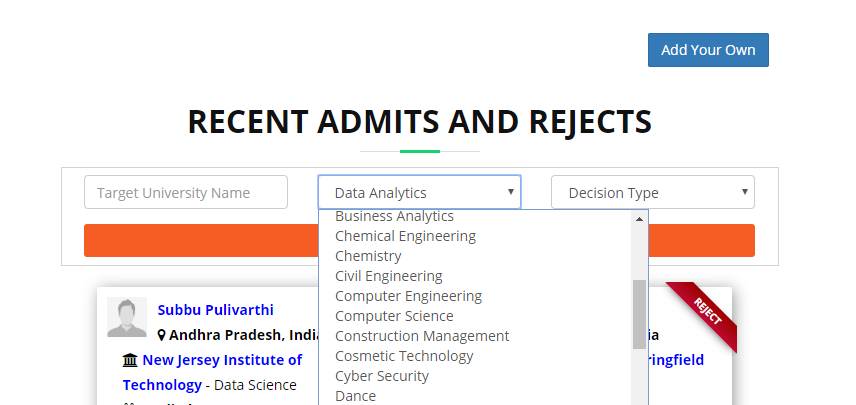What suits you best: MS in Business Analytics, Data Analytics, or MIS?


You can never rise to the top of your game unless you are good at making the right decisions. Choosing the right path involves both critical thinking and intensive analysis. Although both these decision-making elements are cornerstones of analytics, the educational programs that branch out from it are quite different from each other.
The program that will turn out to be the best for you will obviously depend on your career goals and interests. You need to delve deeper into the program information in order to figure out which one fits your life's puzzle.
Despite being interconnected, master's programs in Business Analytics, Data Analytics, and Management Information Systems can be differentiated from each other in terms of the coursework, career outcomes, and the approaches they pursue.
If you are confused between which one to apply for among MSDA, MSBA, and MIS, this article is for you.
MSDA

Master's in Data Analytics (MSDA) is designed to develop technical expertise in gathering, analyzing, and interpreting raw data to reproduce it in a simplified form. The purpose of data analytics is to convey numerical information in a comprehensible format and derive insights from it to support decision-making.
The program lays more emphasis on the technical side and the in-depth study of Data Analytics. This adds a predictive dimension to your analytics that roots from advanced machine learning techniques.
What is Data Analytics?
Data Analytics is the systematic analytics of complex raw data to produce meaningful information using statistical tools. Performing data analytics involves processes like data retrieval, inspecting, processing, cleansing, scrubbing, creating algorithms, and modeling. The key components governing these processes include statistical skills, data visualization, programming, and a lot of math.
So, if you are a data junkie, MSDA is the program you are looking for! It will help you gain specialized knowledge of data as a whole and utilize it to develop data-driven solutions.
As opposed to the Business Analytics program, MSDA pays less attention to business knowledge, leadership, communication, and presentation skills. Find out more about MSBA in the next section.
Course Overview:
- Programming for Data Analysis, Processing, and Visualisation
- Statistics for Data Analytics
- Analytics Modeling
- Data Storage
- Data Mining
- Machine Learning
- Data Visualisation
- Applied Analytics
Take a look at our Decisions Page to check out admitted profiles and get a better idea of which universities you can apply to.

Career Outcomes:
- Data Scientist
- Data Analyst
- Data Architect
- Data Engineer
- Data Mining Specialist
- Business Intelligence Analyst
MSBA

Master's in Business Analytics (MSBA) lays the groundwork for leveraging analytics to improve the overall business performance. The program is principally focussed on the business side of ata analytics.
What is Business Analytics?
Business Analytics is the process of analyzing business requirements, evaluating the findings, and implementing solutions. It aids in identifying business problems and developing effective Key Performance Indicators (KPIs). The goal of Business Analytics is to improve business metrics and optimize existing operations.
As an MSBA graduate, you will have a strong background in business studies that covers a wide range of aspects like Finance, Marketing, and Management. Also, persuasion and influence are considerably important traits that you will have to nurture for delivering strong business presentations and undertaking leadership roles.
Therefore, it is recommended that candidates applying for this program have a work experience of at least 3-4 years. This will help them connect better with the concepts being taught in the classroom.
Now, how does Data Analytics fit into the equation? It helps in harnessing data to find ways for improving business processes. However, the Business Analytics program does not require an in-depth study of Data Analytics contrary to the MSDA program.
Course Overview:
- Business Analytics
- Statistics and Machine Learning
- Optimization Methods
- Business Communication, Dashboarding, Consultation, Strategy, Management
- Marketing Analytics
- Pricing Strategies
Career Outcomes:
- Data Scientists
- Senior Analytics Consultants
- Business Intelligence Analysts
- Pricing and Revenue Optimization Analysts
- Insurance Risk Estimation Analysts
MIS

Source: latrobe.edu.au
Master's in Management Information Systems (MIS) sits at the intersection of Information Technology, Analytics, and Business & Management. It is for IT professionals who are keen on taking more responsibilities and rising up the corporate hierarchy.
The program trains the students to manage, store, and protect information resources as well as understand the key issues associated with IT projects. Graduates gain a comprehensive knowledge of areas like Information Security, Network Architecture, Database Administration, and IT Support.
What is Management Information Systems?
MIS revolves around Information Systems that improve the management processes. The study of Management Information Systems is intended to bridge the gap between IT and business needs.
There are several programs that hook IT with business which include MS in Information Systems, MS in Technology Management, MS in Engineering Management, or MS in Information Management.
The courses present in these programs are overly similar and majorly focus on the study of Information Systems and their business implications. Through the coursework, you will learn to leverage IT to drive business innovation and develop insights into business processes.
It is recommended that interested candidates apply for this program after having a work experience of about 2 years. This is because MIS involves the application of technology into the managerial aspects of business. Practical knowledge will help students find better solutions by relating to their past experiences.
Course Overview:
- IT Policy, Strategy, and Economics
- Database Management
- Information Security and Compliance
- Data Architecture & Management
- Data Warehousing
- Data Systems
- Analysis, Modeling, and Design
- Cloud Services & Solutions
- Project Management
Career Outcomes
- IT Consulting & System Architect
- Cloud Architect
- Digital Analyst
- Marketing Analyst
- Data Analyst
- Quality Assurance Analyst
Conclusion
I believe the above information has cleared your clouds of confusion and now you are ready to apply to your desired program. Therefore, the time is ripe for University Shortlisting.
Sign Up and get it done for free through UniPredict. You can also head over to Services to get expert help.
Since you had the patience to read it all till the end, you deserve to know about this fabulous offer -




